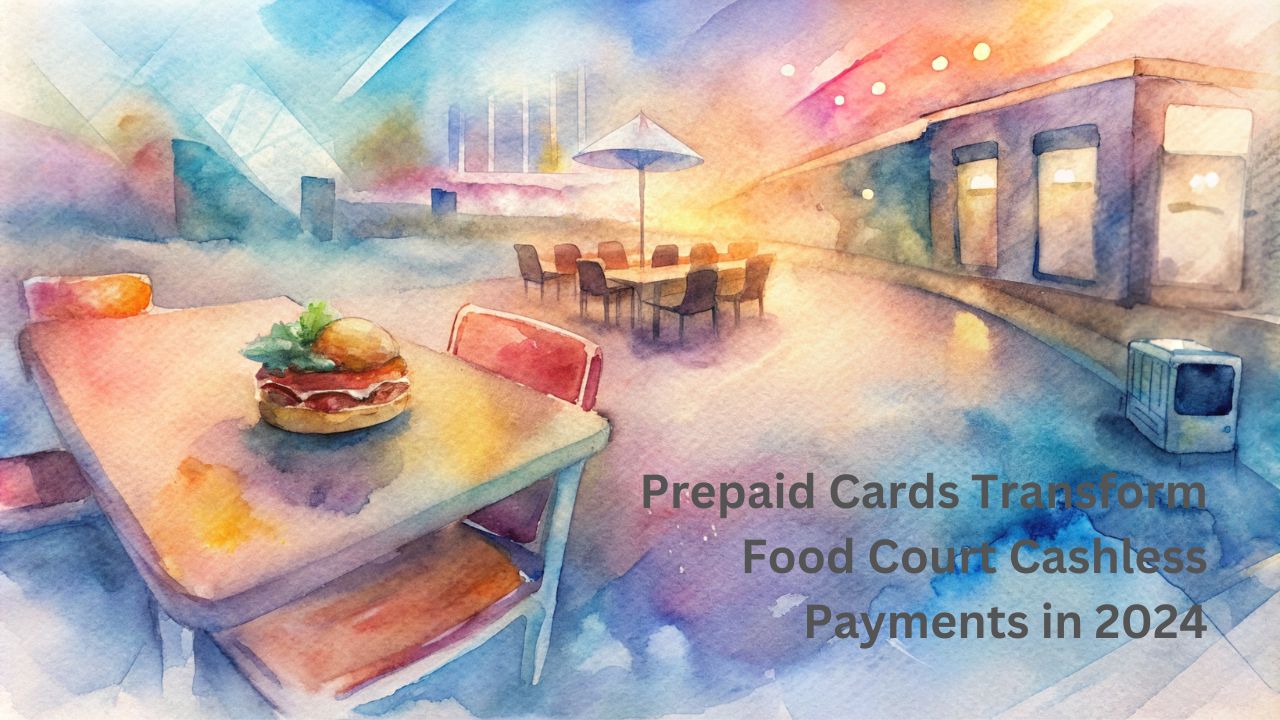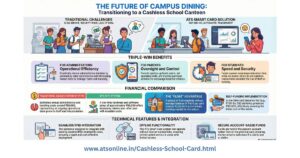Prepaid cards are revolutionizing cashless payments, offering a faster, more convenient, and secure way to pay for your favorite meals. This comprehensive guide explores the benefits of prepaid cards for both customers and food court operators. Learn how prepaid cards can increase efficiency, reduce costs, and improve the overall food court experience.
The food court experience is undergoing a significant transformation. Gone are the days of fumbling for cash in long lines, holding up hungry customers and delaying your lunch break. Cashless payments are revolutionizing the way we pay for food in these bustling communal eating spaces, and prepaid cards are emerging as the front runner in this exciting trend.
This comprehensive guide dives deep into the world of prepaid cards in food courts, exploring the benefits they offer for both customers and food court operators. We’ll examine how prepaid cards work, the advantages they hold over traditional cash transactions, and the future of this innovative payment solution.
The Rise of Cashless Food Courts
The shift towards cashless transactions in food courts is driven by a confluence of factors. According to a study by the National Restaurant Association, a staggering 70% of consumers now prefer to use cashless payment methods when dining out [^1]. This trend is expected to continue, with cashless payments projected to account for 55% of all transactions by 2025 [^2]. Food courts, with their high volume of customers seeking fast and convenient service, are perfectly positioned to capitalize on this growing preference.
There are several advantages that make cashless payments particularly attractive for food courts:
- Increased Efficiency and Faster Service: Cash transactions can be time-consuming, especially during peak hours. Fumbling for change, counting bills, and waiting for change can significantly slow down the service line. Prepaid cards eliminate these delays, allowing for faster customer transactions and shorter lines. This translates to happier customers and a more efficient operation for food court staff, who can focus on order preparation and delivering exceptional customer service.
- Reduced Cash Handling Costs and Security Risks: Managing large amounts of cash can be a logistical and security nightmare for food court operators. Cash handling comes with a number of associated costs, including counting, transportation, and deposit fees. Prepaid cards eliminate the need for cash handling altogether, reducing these costs and minimizing the security risks associated with holding large sums of cash on-site.
- Valuable Data Insights: Prepaid cards offer food court operators a wealth of valuable data on customer spending habits. This data can be used to identify popular menu items, track trends, and gain insights into customer preferences. Armed with this information, food court operators can make data-driven decisions to optimize their menus, promotions, and overall customer experience.
- Potential for Increased Revenue: Prepaid cards open the door for innovative loyalty programs and promotions that can incentivize repeat business and boost revenue. For example, food courts can offer cashback rewards on prepaid card purchases or exclusive discounts for prepaid card holders. Additionally, prepaid cards can encourage customers to spend their remaining balance before it expires, potentially leading to increased revenue.
A Deep Dive into Prepaid Cards for Food Courts
Prepaid cards are a type of payment card that allows users to load a specific amount of money onto the card beforehand. This preloaded value can then be used to make purchases at participating merchants, including food court vendors. Prepaid cards offer a convenient and secure way to pay for food court meals, eliminating the need to carry cash or worry about having exact change.
There are two main types of prepaid cards commonly used in food courts:
- Reusable Prepaid Cards: These cards are typically made of durable plastic and can be reloaded with additional funds after the initial value is depleted. Reusable prepaid cards are often linked to a specific food court or restaurant chain and may offer loyalty program benefits or exclusive discounts.
- Disposable Prepaid Cards: Disposable prepaid cards are typically made of paper or a lighter plastic material and are intended for single-use. These cards are often pre-loaded with a specific amount and cannot be reloaded once the value is spent. Disposable prepaid cards are a convenient option for occasional food court users or those seeking a fixed budget for their meal.
Here’s a closer look at how prepaid cards benefit food court customers:
Convenience and Speed:
- Faster Checkout: Prepaid cards allow for quick and easy transactions, eliminating the need to wait for change or fumble for cash at the counter. This is a significant advantage in fast-paced food court environments where time is often of the essence.
- Perfect for Grab-and-Go Meals: Prepaid cards are ideal for busy individuals who simply want to grab a quick bite to eat and get back to their day. The convenience of prepaid cards eliminates the hassle of cash transactions, allowing for a seamless food court experience.
Budgeting and Expense Tracking (continued):
- Pre-loaded Budget (continued): This eliminates the temptation to overspend and allows you to track your food court expenses more effectively.
- Transaction Tracking: Many prepaid cards come with online portals or mobile apps that allow you to track your spending history. This detailed breakdown of your food court purchases can be helpful for budgeting purposes and gaining insights into your eating habits.
Security and Peace of Mind:
- Reduced Risk of Loss: Unlike cash, which can be easily lost or stolen, prepaid cards offer greater security. If a prepaid card is lost or stolen, the remaining balance can often be frozen or replaced, minimizing financial loss.
- Purchase Protection Features: Some prepaid cards offer purchase protection features that can provide additional peace of mind. These features may cover unauthorized transactions or protect against damaged or faulty items purchased with the card.
Here’s a closer look at how prepaid cards benefit food court operators:
Increased Efficiency and Throughput:
- Faster Transactions: As mentioned earlier, prepaid cards eliminate the delays associated with cash transactions. This leads to faster customer service, shorter lines, and a smoother overall experience for everyone.
- Improved Staff Productivity: With less time spent handling cash, food court staff can focus on other important tasks, such as order preparation, customer service, and maintaining a clean and organized environment.
Reduced Cash Handling Costs:
- Eliminated Cash Management: Prepaid cards eliminate the need for cash counting, transportation, and deposit fees associated with traditional cash transactions. This translates to significant cost savings for food court operators.
- Reduced Security Risks: By minimizing the amount of cash on-site, prepaid cards reduce the risk of theft or robbery. This provides peace of mind for food court operators and creates a safer work environment for staff.
Valuable Data Insights:
- Customer Spending Habits: Prepaid card transactions provide valuable data on customer spending habits. This data can be used to identify popular menu items, track sales trends, and understand customer preferences. For example, food court operators can analyze data to see which vendors are most popular at certain times of the day or which items are frequently purchased together. This information can be used to optimize menus, pricing strategies, and marketing campaigns.
- Loyalty Program Integration: Prepaid cards can be seamlessly integrated with loyalty programs, allowing food court operators to reward repeat customers and incentivize spending. Loyalty programs can be designed to offer points, discounts, or special rewards based on the amount spent using a prepaid card.
Potential for Increased Revenue:
- Loyalty Programs: As mentioned above, prepaid cards can be used to implement loyalty programs that encourage repeat business and boost revenue. Customers are more likely to return to a food court if they know they can earn rewards for their purchases.
- Upselling and Promotions: Prepaid cards can be used to promote specific menu items or combo deals. For example, food court operators can offer exclusive discounts or bonus rewards for purchasing certain items using a prepaid card.
- Reduced Cash Leakage: Unlike cash, which can be easily spent outside the food court, prepaid cards ensure that all funds loaded onto the card are spent within the participating vendors. This reduces cash leakage and increases revenue for the food court.
Case Study: How Food Courts are Benefiting from Prepaid Cards
Consider a large office building with a bustling food court serving hundreds of employees daily. Traditionally, cash transactions were the primary payment method, leading to long lines and inefficient service during peak lunch hours. The food court implemented a reusable prepaid card system.
Since the switch, customer satisfaction has increased significantly. Lines have become shorter, and staff can focus on providing excellent customer service. Additionally, the food court has gained valuable data insights into customer spending habits, allowing them to optimize their menu offerings and promotions. This has resulted in a 15% increase in overall revenue since the implementation of the prepaid card system.
Looking ahead: The Future of Prepaid Cards in Food Courts
The future of prepaid cards in food courts is bright. As technology continues to evolve, we can expect to see even more innovative applications of prepaid cards in this space. Here are some potential trends to watch:
- Integration with Mobile Apps: Prepaid cards will likely be integrated with mobile apps, allowing customers to order, pay, and track their purchases directly from their smartphones. This will further streamline the food court experience and provide even greater convenience for customers.
- Personalized Recommendations and Loyalty Programs: Prepaid card data can be used to personalize the food court experience for customers. For example, customers may receive personalized recommendations for menu items based on their past purchases. Loyalty programs can also be further customized to offer targeted rewards and incentives.
- Self-Service Kiosks and Contactless Payments:
The rise of self-service kiosks and contactless payments is another exciting trend that will likely shape the future of food courts. Customers can use prepaid cards to make contactless payments at self-service kiosks, eliminating the need to wait in line and further enhancing the convenience factor. This technology can be particularly beneficial for busy food courts or those with limited space for traditional cashier stations.
Benefits of Self-Service Kiosks and Contactless Payments with Prepaid Cards:
- Reduced Wait Times: Customers can order and pay for their meals quickly and efficiently using self-service kiosks, eliminating the need to wait in line for a cashier.
- Increased Throughput: Self-service kiosks can handle multiple orders simultaneously, leading to increased customer throughput and improved efficiency for the food court.
- Improved Order Accuracy: Customers can use self-service kiosks to customize their orders and ensure accuracy by entering their selections directly.
- Enhanced Customer Experience: Self-service kiosks and contactless payments offer a modern and convenient way for customers to interact with the food court, potentially leading to a more positive dining experience.
Security Considerations for Prepaid Cards in Food Courts:
While prepaid cards offer a multitude of benefits for both customers and food court operators, it’s important to consider security measures. Here are some key points to keep in mind:
- Choose a Reputable Prepaid Card Provider: Food court operators should partner with a reputable prepaid card provider that offers robust security features, such as PIN verification, transaction encryption, and lost/stolen card protection.
- Educate Customers: Food court operators should educate customers about the security features of prepaid cards and encourage them to take steps to protect their cards, such as memorizing their PIN and reporting lost or stolen cards immediately.
- Compliance with Regulations: It’s crucial to ensure that the prepaid card system complies with all relevant financial regulations to protect customer data and prevent fraud.
In Conclusion
Prepaid cards are revolutionizing the way we pay for food in food courts. They offer a faster, more convenient, and secure payment solution for customers, while providing food court operators with numerous benefits such as increased efficiency, reduced costs, and valuable customer insights. As technology continues to evolve, we can expect to see even more innovative applications of prepaid cards in food courts, further enhancing the dining experience for everyone involved.
Considering Implementing Prepaid Cards in Your Food Court?
If you’re a food court operator considering implementing a prepaid card system, ATS can help. ATS offers a comprehensive suite of food court management solutions, including cashless payment systems with prepaid card functionality.
Contact ATS today to learn more about how they can help you streamline your food court operations and enhance the customer experience. You can reach us by phone at +91 9810078010 or by email at ats.fnb@gmail.com.
www.foodcourtbilling.com
Thank you for your interest in our services.
Additional Resources:
- National Restaurant Association: https://restaurant.org/
- Food Court Billing Software: https://foodcourtbilling.com/
- Labhak Prepaid Card Software: https://labhak.com/shop/
.
FAQs:
1. Are prepaid cards safe for food courts?
Yes! Many prepaid cards offer PIN verification & lost card protection.
2. How do prepaid cards work in food courts?
Load value beforehand, swipe at vendors, track spending online.
3. What are the benefits of prepaid cards for customers?
Faster checkout, budget control, security, expense tracking.
4. What are the benefits of prepaid cards for food courts?
Reduced cash handling, increased efficiency, and valuable customer data.
5. Are disposable prepaid cards a good option?
Great for single use or fixed budgets in food courts!




